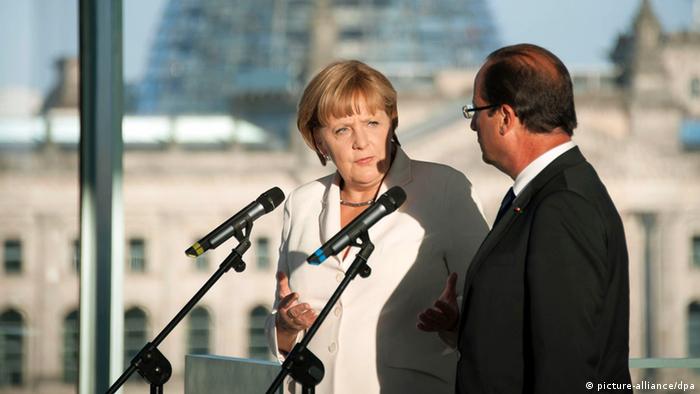Germany and France have warned Greece it must stick to its program of austerity reforms. Greek Prime Minister Antonis Samaris is expected to push European powers for more leeway on its bailout deal in the coming days.
The German Chancellor Angela Merkel and French President Francois Hollande put forward a united front when they met in Berlin on Thursday to fine-tune their message to Prime Minister Samaris.
"It is important for me that we all stick to our commitments... but I will encourage Greece to continue along its path of reforms," Merkel said in a brief statement ahead of a working dinner with Hollande.
She said Greece should wait for the results of a highly anticipated so-called "troika" report on its progress in implementing reforms before discussing any flexibility on its bailout deal. The report from Greece's international lenders is due out in September.
For his part Hollande said he wanted Greece to stay in the eurozone, but that it remained in the hands of the Greeks themselves.
"It's up to the Greeks to make the effort that is essential for that goal to be met," said the president, standing alongside Merkel.
Greece needs 'air to breathe'
Samaris is expected to appeal to Europe's big powers that Greece needs more time to meet the targets when he meets Merkel and Hollande. He is first due in Berlin for talks on Friday and is then scheduled to make his case with Hollande in Paris on Saturday.
The Greek Prime Minister also told the German daily Bild on Wednesday that Athens was committed to the austerity targets, but needed more flexibility to pull the country's economy out of its fifth year of recession.
"All we want is a bit of air to breathe to get the economy running and to increase state income," Samaris said.
In exchange for its bailout package, Athens is required to reduce Greece's national budget deficit to less than three percent of the country's gross domestic product (GDP) by 2014. In 2011, the budget deficit stood at 9.3 percent of GDP.
The 11.5 billion euros ($14.3 billion) in budget cuts are expected to hit pensions, social benefits, public sector wages and health care. Some 40,000 civil servants are also expected to lose their jobs. Politicians in Athens have been struggling to reach a deal, with the cuts required in order for Greece to receive the latest tranch of around 31.5 billion euros in international loans.
ccp/lw (AFP, Reuters, dpa) dw de

Comments